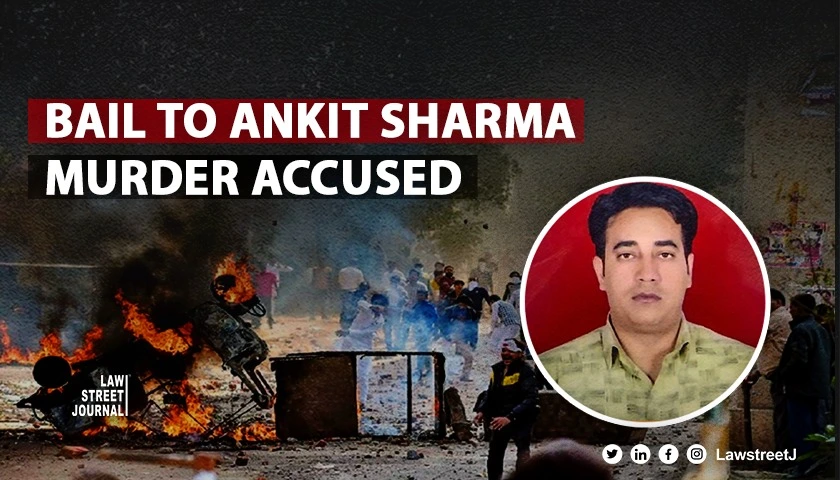New Delhi: The Delhi High Court has granted bail to one of the accused accused persons in a case relating to the killing of Intelligence Bureau (IB) staffer Ankit Sharma during the February 2020 northeast Delhi riots. With this, 3 accused persons in the Ankit Sharma murder case are now out on bail.
The Court while granting bail also held that during the pendency of the trial, bail is the rule while jail is an exception.
Though a long period of incarceration alone may not be sufficient to grant bail to an accused in a case which is punishable with death or life imprisonment, however, it would weigh with the Court while considering a balance to be struck between the interest of the prosecution/society and the rights of the accused guaranteed under Article 21 of the Constitution of India," it stated.
It also emphasized that the issue of the credibility and reliability of witnesses presented by the prosecution should not be addressed by the Court during the stage of bail application.
However, the Court has refused to grant bail to a fourth accused, Nazim, on the grounds that crucial public witnesses were still not examined and that his release could potentially lead to interference or intimidation of said witnesses.
Further, it also noted that Nazim had a bad character, referring to nearly 12 prior FIRs against him.
FACTS
The Court was hearing a bail application filed by the accused persons in a case relating to the murder of an IB Officer Ankit Sharma who was murdered during the Northeast Delhi anti-Citizenship Amendment Act (CAA) riots in 2020.
The charges in the case were framed by the trial court in March last year against Shoaib Alam, Gulfam, Javed, Nazim, former AAP councilor Tahir Hussain, and others.
The accused were charged under Sections 147 (rioting), 148 (rioting, armed with deadly weapon), 153A (promoting enmity between different groups on grounds of religion, race, place of birth, residence), 302 (murder) read with 120B (criminal conspiracy) of the Indian Penal Code (IPC).
ARGUMENTS
Sr. Adv. Rebecca John argued that the prosecution has cited almost 114 witnesses, out of which only 11 have been examined so far. Further, they argued that the applicant cannot be made to suffer a long period of incarceration when the trial is not likely to conclude anytime soon.
Further, she also argued that there was no material on record to implicate the applicant in the murder of the deceased.
However, the Special Public Prosecutor argued that the applicant was a part of the mob and that being a member of the unlawful assembly, the applicant shared a common object and knew that the offence was likely to be committed in the prosecution of such a common object.
He further argued that in case of mass violence, delay in completion of the trial cannot be a ground to release the accused on bail.
DECISION
The court after hearing both the parties noted that though the offence charged against the applicant was heinous and grave, and if proven, can be punishable with death or life imprisonment, even with the best efforts of the Trial Court, the trial is not likely to conclude any time soon.
The accused has already been in jail for almost 4 years. Hence, the Court granted him bail reasoning that the purpose of keeping an accused in jail during the trial is to ensure that he faces trial, does not abscond, and, if found guilty, is available to serve his sentence. The purpose is not to punish the accused.
However, the court also clarified that the observation made by it on the merits of the case was purely for the purposes of deciding the question of grant of bail and shall not be construed as an expression on the merits of the matter.



![Delhi High Court Sets Aside Arbitral Tribunal's Award Against NHAI in Highway Project Delay Case [Read Judgment]](/secure/uploads/2023/07/lj_9605_23374c2e-392c-4491-a2fe-f2f12fc5272f.jpg)
![Delhi Court Rejects Stay Request in Defamation Case Against Rajasthan CM Ashok Gehlot [Read Order]](/secure/uploads/2023/08/lj_5208_80de1ddc-d76a-4f7f-b180-408e3ae14fb4.jpg)







